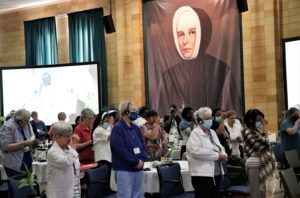General Chapter 2022
A General Chapter is the culminating moment for a religious congregation. Currently, from July 12 to August 2, at the Motherhouse, the 31st General Chapter of the Sisters of Providence is being held in Providence Hall. Around one hundred delegates (Sisters of Providence from different countries and origins) are meeting face-to-face and by Zoom, to share their gifts, follow the inspiration of the Holy Spirit, and make capital decisions that will have repercussions for the next five years. Among these capital decisions are the General Orientations (guidelines for the whole Congregation) and the election of the new General Leadership Team. Thus, the delegates will first fulfill their primary responsibility, that of preserving the spiritual heritage of the Congregation.
 In the following lines, we will share the Reflection on the Gospel according to Saint Matthew, 12, 1-8 of July 15, 2022, that is part of our General Chapter daily Mass.
In the following lines, we will share the Reflection on the Gospel according to Saint Matthew, 12, 1-8 of July 15, 2022, that is part of our General Chapter daily Mass.
We remember that the Pharisees are on the lookout for the slightest gesture or word from Jesus to accuse him.
The Gospel we just read shows Jesus walking through a field of grain. Jesus is an admirer of nature and often uses what he has seen and heard to help us understand the truths from above.
Naturally, his disciples follow him faithfully, as do the Pharisees. Even though the Pharisees do not always accept Jesus’s teachings, their goal is not to understand his words, but to find fault with him so that they have reason to accuse and eliminate him.
Then the disciples are hungry. They pick up the heads of grain and eat them, which the Pharisees observe. Normally, the law forbids harvesting on the Sabbath; it is work forbidden by the law. The Pharisees question Jesus about the behavior of the disciples: picking heads of grain and eating them on the Sabbath is forbidden. This time, the prohibition concerns work.
Then Jesus recalls events from the Old Testament, according to the Law of Moses.
1st example: “Have you not read what David did when he and his companions were hungry, how he went into the house of God and ate the bread of offering, which neither he nor his companions but only the priests could lawfully eat?”
2nd Example: “Have you not read in the law that on the sabbath the priests serving in the temple violate the sabbath and are innocent?”
Jesus does not mock the law, but he establishes the values announced by the prophets: “If you knew what this meant, ‘I desire mercy, not sacrifice’, you would not have condemned these innocent men.”
+ Mercy or compassion is of greater value than sacrifice.
+ To give food to the hungry, service is greater than the Law.
+ Actions such as sheltering refugees, caring for the sick, protecting abused or abandoned children, fighting against injustice, and tending to other needs identified in our neighbors serve to perfect the law.
+ The law is meant to set us free.
+ The attachment to rites and customs can make us forget mercy.
+ Mercy does not judge nor condemn. It acts according to the law of love and compassion.
+ Lord, open our eyes and touch our hearts according to your law of freedom and love. Amen.
Jeanne d’Arc Dubé, SP



